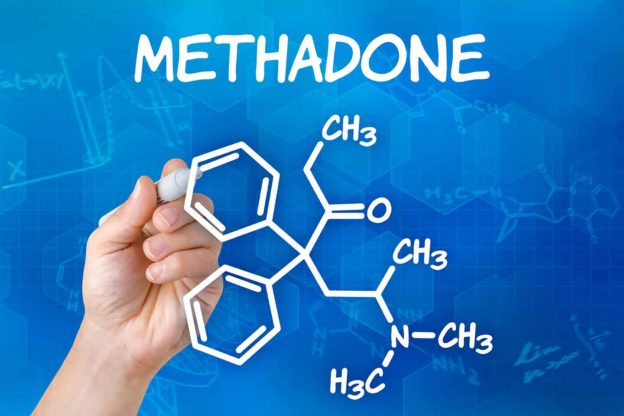Methadone is a prescription opioid drug, also referred to as a maintenance medication. It is often given to prevent an opioid-dependent person from the onset of withdrawal symptoms or engage in illicit drug use. The issue is that withdrawing from methadone can be lengthy and extremely painful; for those reasons, many people choose to undergo a rapid methadone detox.
What is Methadone?
Methadone is an opiate, which means it is in the same class as morphine, codeine, OxyContin, and heroin. Opiates interact with the central nervous system to cause various neurological effects. Doctors prescribe opiates for their pain-relieving effects. Recreational drug abusers use opiates for their euphoric effects. Other neurological effects include relaxation, drowsiness, and slowed breathing.
Tolerance
The body adapts to the presence of methadone and other opiates and grows increasingly tolerant to the effects of these drugs. This means a consumer must take increasingly stronger doses to achieve the same effects. A physician can increase the dosage slowly to avoid serious side effects of rapid dosage increases, especially overdose and death. Unfortunately, many people increase dosages without consulting a doctor. Soon, they must take dangerously large doses to get high or avoid withdrawal symptoms which can lead to a methadone overdose.
Physical Dependence
Continued use of any opiate, especially at high doses, also increases the consumer’s risk for addiction and dependence. An addicted person experiences intense cravings and engages in drug-seeking behaviors when they stop taking opiates. A physically dependent person experiences severe and prolonged flu-like withdrawal symptoms when opiate levels run low in their body.
For over 26 years, people from all over the world have chosen Waismann Method as their opioid detox provider.
We know the challenges you face and the importance of creating a unique and personal experience for you right from the start.Call for Detox Options 1-800-423-2482
The human body adapts to the constant exposure to the toxic effects of opiates by changing its chemistry – it becomes dependent on having a certain level of opiates to feel “normal.” When opiate levels drop, the opiate-dependent body struggles to adjust to its new toxin-free chemistry. The opiate-dependent person experiences this detoxification through uncomfortable withdrawal symptoms.
Methadone prevents the onset of these withdrawal symptoms. Because methadone is an opiate, it keeps opiate levels in the body high enough to delay withdrawal symptoms. Concerning heroin and other opiates, however, methadone causes relatively little euphoria, making it a suitable replacement drug.
One of the most significant drawbacks to methadone detox is that it is a very lengthy treatment and addictive in comparison to other methods of detoxification. Instead of experiencing minimized withdrawal symptoms for days – or hours when rapid detox is used – methadone treatments can last for years. In fact, the National Institute on Drug Abuse suggests patients stay on methadone for at least one year.
What are the Side Effects of Methadone?
Typical side effects of methadone can include:
- anxiety
- restlessness
- insomnia
- drowsiness
- dry mouth
- nausea
- constipation
- decreased sex drive
- impotence, or trouble having an orgasm.
Some side effects that might need immediate medical assistance, including:
- shallow breathing
- hallucinations
- confusion
- chest pain
- dizziness
- fast heart rate
Dosage for Methadone
A physician should decide an adequate dosage of methadone based on the patient’s age, health condition, dependency history, tolerance, and other vital factors.
What Medications, Substances, or Supplements Adversely Interact with Methadone?
Methadone side effects can change when mixed with other alcohol, anti-histamine, opioids, sedatives, muscle relaxers, diuretics, heart or blood pressure medications, and many other substances. For this reason, it is vital always to tell your prescribing doctor all drugs, substances, over-the-counter medications, and supplements you use to prevent potential adverse side effects.
Treatment for Methadone Addiction
Medically Assisted Detox
After such prolonged use, people who try to get off methadone can find it a difficult, uphill battle. In fact, Harvard Medical School says that 25 percent continue to take the drug, another 25 percent of methadone patients eventually abstain, and 50 percent of methadone users go on and off the drug for the rest of their lives.
Methadone is a Schedule II controlled substance, so it’s subject to federal regulations. One dose lasts only 24 to 36 hours before withdrawal symptoms set in. This means patients must come to special methadone clinics to receive their medication. Going to a methadone clinic every day for the rest of one’s life is time-consuming, inconvenient, and often embarrassing.
Using methadone for a long time increases the risk of dangerous side effects, including overdose deaths. There has been a drastic uptick in the number of overdose deaths due to methadone. The number of deaths peaked in 2007. In 2010, according to the Centers for Disease Control and Prevent, 39 percent of all opiate-related overdose deaths were associated with methadone when only one drug was involved. While most of these deaths are associated with using methadone for pain relief, anyone who uses methadone is at risk for side effects, including death from overdose effects.
Waismann Method Rapid Methadone Detox
While methadone has an accepted medical use, its federal classification as a controlled substance also has a high potential for abuse. Most people who take methadone or other opiate medications do not set out to become dependent upon them. It can just happen with regular use. People who fall into this unfortunate and fast-moving trap may feel like there is no way out. Fortunately, there are several safe, quality treatment options for opiate dependency, including the Rapid Detox by Waismann Method®.
Methadone dependency doesn’t have to keep you down any longer. If you want safe and effective detox that provides lasting results, call us at 1-888-987-4673.
“After a 12 year Methadone addiction, I’m coming home clean, with a smile on my face” — Patient Treated with Rapid Methadone Detox.






